Impact of Power, Politics, and Culture on Employee Performance
VerifiedAdded on 2022/12/27
|10
|3106
|197
AI Summary
This report evaluates the impact of power, politics, and culture on employee performance in organizations, with a focus on Toyota. It also examines the effectiveness of motivational theories on employee performance.
Contribute Materials
Your contribution can guide someone’s learning journey. Share your
documents today.
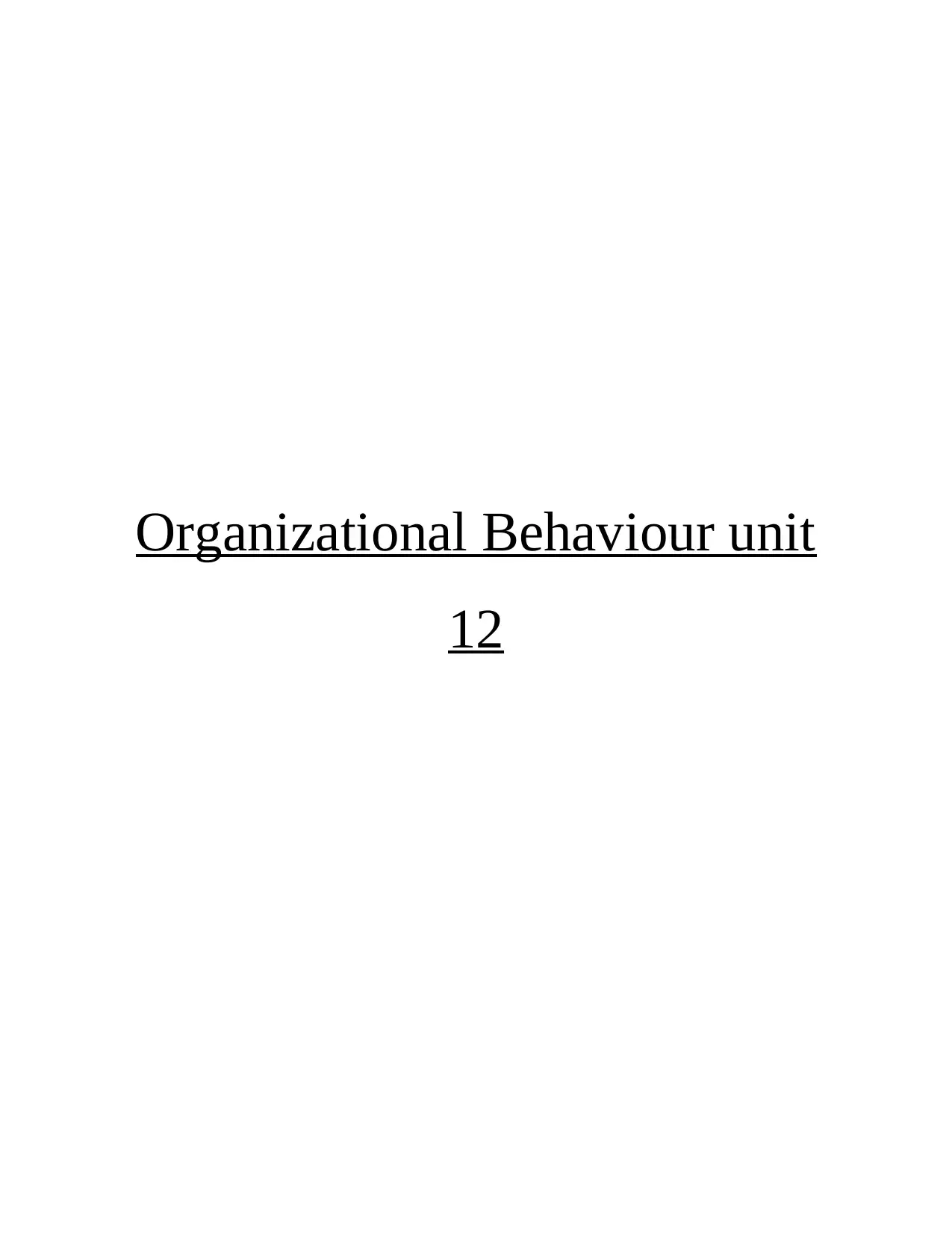
Organizational Behaviour unit
12
12
Secure Best Marks with AI Grader
Need help grading? Try our AI Grader for instant feedback on your assignments.
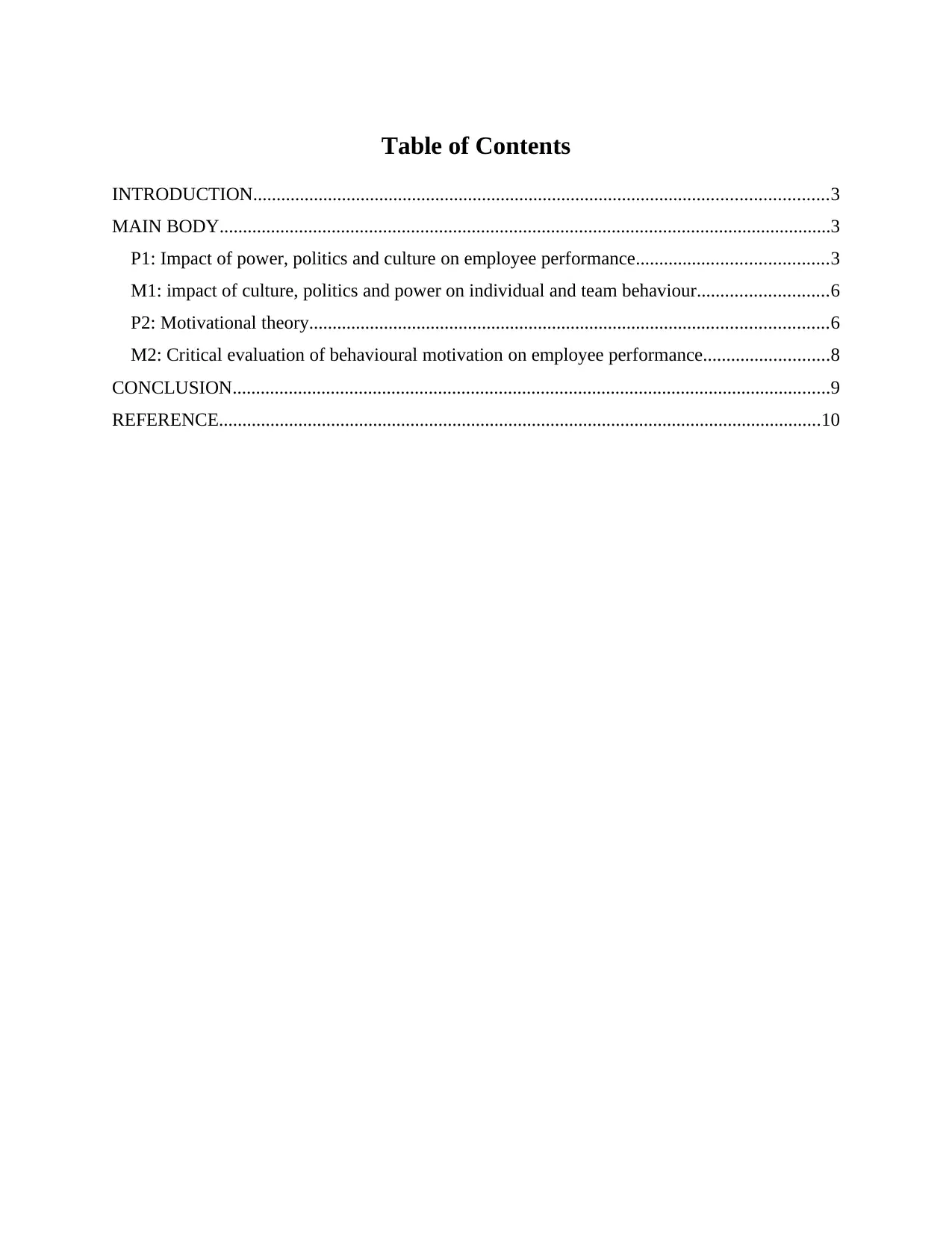
Table of Contents
INTRODUCTION...........................................................................................................................3
MAIN BODY...................................................................................................................................3
P1: Impact of power, politics and culture on employee performance.........................................3
M1: impact of culture, politics and power on individual and team behaviour............................6
P2: Motivational theory...............................................................................................................6
M2: Critical evaluation of behavioural motivation on employee performance...........................8
CONCLUSION................................................................................................................................9
REFERENCE.................................................................................................................................10
INTRODUCTION...........................................................................................................................3
MAIN BODY...................................................................................................................................3
P1: Impact of power, politics and culture on employee performance.........................................3
M1: impact of culture, politics and power on individual and team behaviour............................6
P2: Motivational theory...............................................................................................................6
M2: Critical evaluation of behavioural motivation on employee performance...........................8
CONCLUSION................................................................................................................................9
REFERENCE.................................................................................................................................10
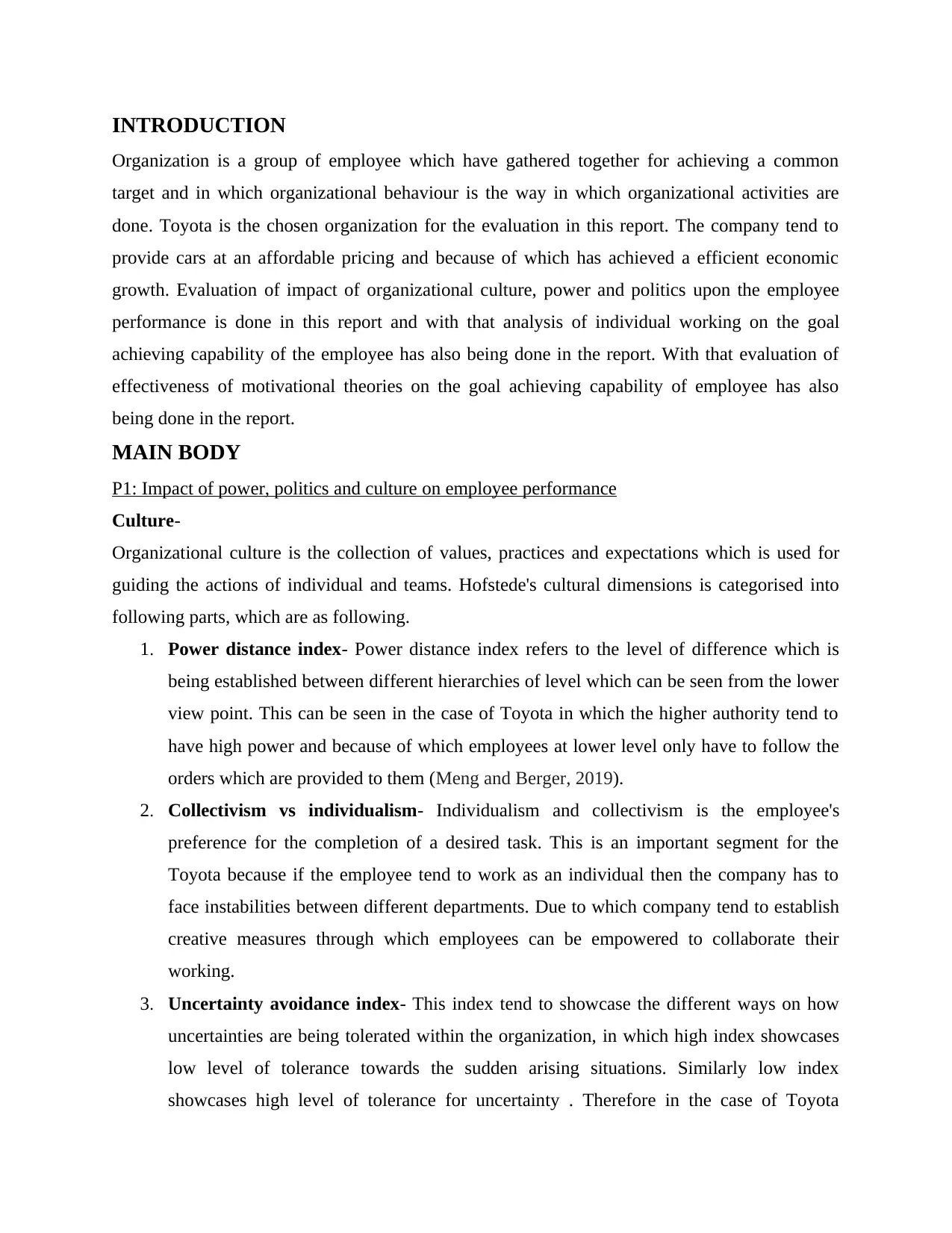
INTRODUCTION
Organization is a group of employee which have gathered together for achieving a common
target and in which organizational behaviour is the way in which organizational activities are
done. Toyota is the chosen organization for the evaluation in this report. The company tend to
provide cars at an affordable pricing and because of which has achieved a efficient economic
growth. Evaluation of impact of organizational culture, power and politics upon the employee
performance is done in this report and with that analysis of individual working on the goal
achieving capability of the employee has also being done in the report. With that evaluation of
effectiveness of motivational theories on the goal achieving capability of employee has also
being done in the report.
MAIN BODY
P1: Impact of power, politics and culture on employee performance
Culture-
Organizational culture is the collection of values, practices and expectations which is used for
guiding the actions of individual and teams. Hofstede's cultural dimensions is categorised into
following parts, which are as following.
1. Power distance index- Power distance index refers to the level of difference which is
being established between different hierarchies of level which can be seen from the lower
view point. This can be seen in the case of Toyota in which the higher authority tend to
have high power and because of which employees at lower level only have to follow the
orders which are provided to them (Meng and Berger, 2019).
2. Collectivism vs individualism- Individualism and collectivism is the employee's
preference for the completion of a desired task. This is an important segment for the
Toyota because if the employee tend to work as an individual then the company has to
face instabilities between different departments. Due to which company tend to establish
creative measures through which employees can be empowered to collaborate their
working.
3. Uncertainty avoidance index- This index tend to showcase the different ways on how
uncertainties are being tolerated within the organization, in which high index showcases
low level of tolerance towards the sudden arising situations. Similarly low index
showcases high level of tolerance for uncertainty . Therefore in the case of Toyota
Organization is a group of employee which have gathered together for achieving a common
target and in which organizational behaviour is the way in which organizational activities are
done. Toyota is the chosen organization for the evaluation in this report. The company tend to
provide cars at an affordable pricing and because of which has achieved a efficient economic
growth. Evaluation of impact of organizational culture, power and politics upon the employee
performance is done in this report and with that analysis of individual working on the goal
achieving capability of the employee has also being done in the report. With that evaluation of
effectiveness of motivational theories on the goal achieving capability of employee has also
being done in the report.
MAIN BODY
P1: Impact of power, politics and culture on employee performance
Culture-
Organizational culture is the collection of values, practices and expectations which is used for
guiding the actions of individual and teams. Hofstede's cultural dimensions is categorised into
following parts, which are as following.
1. Power distance index- Power distance index refers to the level of difference which is
being established between different hierarchies of level which can be seen from the lower
view point. This can be seen in the case of Toyota in which the higher authority tend to
have high power and because of which employees at lower level only have to follow the
orders which are provided to them (Meng and Berger, 2019).
2. Collectivism vs individualism- Individualism and collectivism is the employee's
preference for the completion of a desired task. This is an important segment for the
Toyota because if the employee tend to work as an individual then the company has to
face instabilities between different departments. Due to which company tend to establish
creative measures through which employees can be empowered to collaborate their
working.
3. Uncertainty avoidance index- This index tend to showcase the different ways on how
uncertainties are being tolerated within the organization, in which high index showcases
low level of tolerance towards the sudden arising situations. Similarly low index
showcases high level of tolerance for uncertainty . Therefore in the case of Toyota
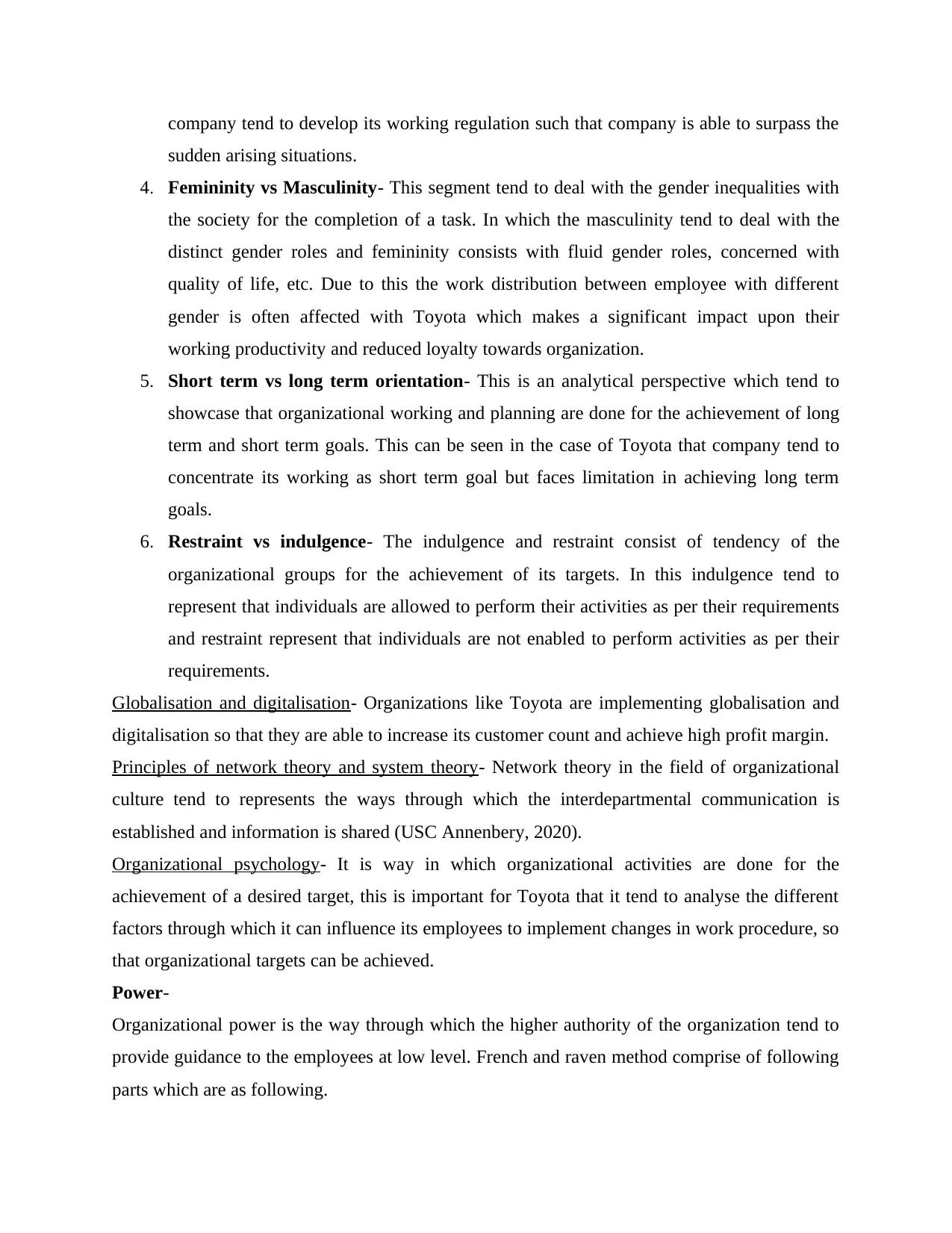
company tend to develop its working regulation such that company is able to surpass the
sudden arising situations.
4. Femininity vs Masculinity- This segment tend to deal with the gender inequalities with
the society for the completion of a task. In which the masculinity tend to deal with the
distinct gender roles and femininity consists with fluid gender roles, concerned with
quality of life, etc. Due to this the work distribution between employee with different
gender is often affected with Toyota which makes a significant impact upon their
working productivity and reduced loyalty towards organization.
5. Short term vs long term orientation- This is an analytical perspective which tend to
showcase that organizational working and planning are done for the achievement of long
term and short term goals. This can be seen in the case of Toyota that company tend to
concentrate its working as short term goal but faces limitation in achieving long term
goals.
6. Restraint vs indulgence- The indulgence and restraint consist of tendency of the
organizational groups for the achievement of its targets. In this indulgence tend to
represent that individuals are allowed to perform their activities as per their requirements
and restraint represent that individuals are not enabled to perform activities as per their
requirements.
Globalisation and digitalisation- Organizations like Toyota are implementing globalisation and
digitalisation so that they are able to increase its customer count and achieve high profit margin.
Principles of network theory and system theory- Network theory in the field of organizational
culture tend to represents the ways through which the interdepartmental communication is
established and information is shared (USC Annenbery, 2020).
Organizational psychology- It is way in which organizational activities are done for the
achievement of a desired target, this is important for Toyota that it tend to analyse the different
factors through which it can influence its employees to implement changes in work procedure, so
that organizational targets can be achieved.
Power-
Organizational power is the way through which the higher authority of the organization tend to
provide guidance to the employees at low level. French and raven method comprise of following
parts which are as following.
sudden arising situations.
4. Femininity vs Masculinity- This segment tend to deal with the gender inequalities with
the society for the completion of a task. In which the masculinity tend to deal with the
distinct gender roles and femininity consists with fluid gender roles, concerned with
quality of life, etc. Due to this the work distribution between employee with different
gender is often affected with Toyota which makes a significant impact upon their
working productivity and reduced loyalty towards organization.
5. Short term vs long term orientation- This is an analytical perspective which tend to
showcase that organizational working and planning are done for the achievement of long
term and short term goals. This can be seen in the case of Toyota that company tend to
concentrate its working as short term goal but faces limitation in achieving long term
goals.
6. Restraint vs indulgence- The indulgence and restraint consist of tendency of the
organizational groups for the achievement of its targets. In this indulgence tend to
represent that individuals are allowed to perform their activities as per their requirements
and restraint represent that individuals are not enabled to perform activities as per their
requirements.
Globalisation and digitalisation- Organizations like Toyota are implementing globalisation and
digitalisation so that they are able to increase its customer count and achieve high profit margin.
Principles of network theory and system theory- Network theory in the field of organizational
culture tend to represents the ways through which the interdepartmental communication is
established and information is shared (USC Annenbery, 2020).
Organizational psychology- It is way in which organizational activities are done for the
achievement of a desired target, this is important for Toyota that it tend to analyse the different
factors through which it can influence its employees to implement changes in work procedure, so
that organizational targets can be achieved.
Power-
Organizational power is the way through which the higher authority of the organization tend to
provide guidance to the employees at low level. French and raven method comprise of following
parts which are as following.
Secure Best Marks with AI Grader
Need help grading? Try our AI Grader for instant feedback on your assignments.
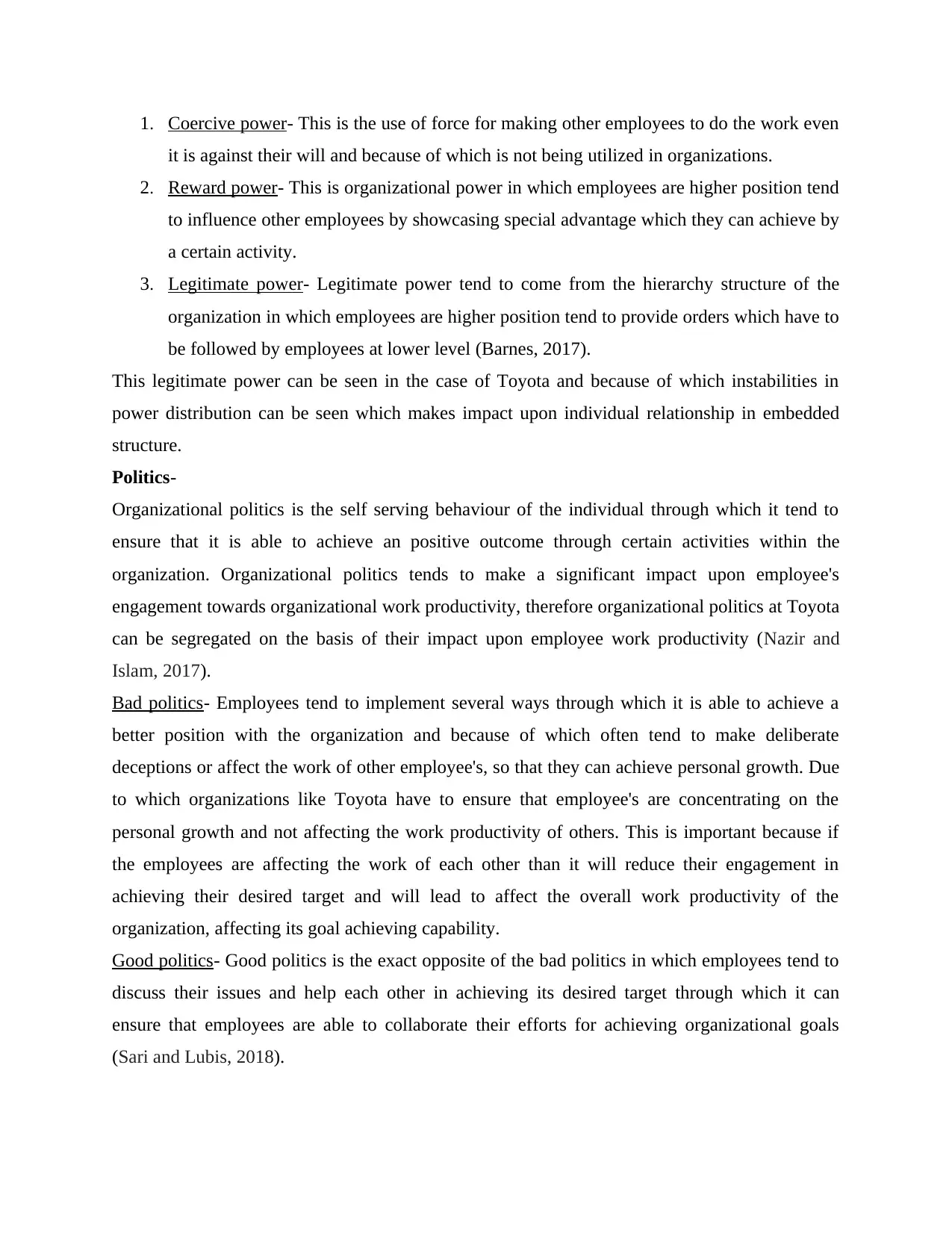
1. Coercive power- This is the use of force for making other employees to do the work even
it is against their will and because of which is not being utilized in organizations.
2. Reward power- This is organizational power in which employees are higher position tend
to influence other employees by showcasing special advantage which they can achieve by
a certain activity.
3. Legitimate power- Legitimate power tend to come from the hierarchy structure of the
organization in which employees are higher position tend to provide orders which have to
be followed by employees at lower level (Barnes, 2017).
This legitimate power can be seen in the case of Toyota and because of which instabilities in
power distribution can be seen which makes impact upon individual relationship in embedded
structure.
Politics-
Organizational politics is the self serving behaviour of the individual through which it tend to
ensure that it is able to achieve an positive outcome through certain activities within the
organization. Organizational politics tends to make a significant impact upon employee's
engagement towards organizational work productivity, therefore organizational politics at Toyota
can be segregated on the basis of their impact upon employee work productivity (Nazir and
Islam, 2017).
Bad politics- Employees tend to implement several ways through which it is able to achieve a
better position with the organization and because of which often tend to make deliberate
deceptions or affect the work of other employee's, so that they can achieve personal growth. Due
to which organizations like Toyota have to ensure that employee's are concentrating on the
personal growth and not affecting the work productivity of others. This is important because if
the employees are affecting the work of each other than it will reduce their engagement in
achieving their desired target and will lead to affect the overall work productivity of the
organization, affecting its goal achieving capability.
Good politics- Good politics is the exact opposite of the bad politics in which employees tend to
discuss their issues and help each other in achieving its desired target through which it can
ensure that employees are able to collaborate their efforts for achieving organizational goals
(Sari and Lubis, 2018).
it is against their will and because of which is not being utilized in organizations.
2. Reward power- This is organizational power in which employees are higher position tend
to influence other employees by showcasing special advantage which they can achieve by
a certain activity.
3. Legitimate power- Legitimate power tend to come from the hierarchy structure of the
organization in which employees are higher position tend to provide orders which have to
be followed by employees at lower level (Barnes, 2017).
This legitimate power can be seen in the case of Toyota and because of which instabilities in
power distribution can be seen which makes impact upon individual relationship in embedded
structure.
Politics-
Organizational politics is the self serving behaviour of the individual through which it tend to
ensure that it is able to achieve an positive outcome through certain activities within the
organization. Organizational politics tends to make a significant impact upon employee's
engagement towards organizational work productivity, therefore organizational politics at Toyota
can be segregated on the basis of their impact upon employee work productivity (Nazir and
Islam, 2017).
Bad politics- Employees tend to implement several ways through which it is able to achieve a
better position with the organization and because of which often tend to make deliberate
deceptions or affect the work of other employee's, so that they can achieve personal growth. Due
to which organizations like Toyota have to ensure that employee's are concentrating on the
personal growth and not affecting the work productivity of others. This is important because if
the employees are affecting the work of each other than it will reduce their engagement in
achieving their desired target and will lead to affect the overall work productivity of the
organization, affecting its goal achieving capability.
Good politics- Good politics is the exact opposite of the bad politics in which employees tend to
discuss their issues and help each other in achieving its desired target through which it can
ensure that employees are able to collaborate their efforts for achieving organizational goals
(Sari and Lubis, 2018).
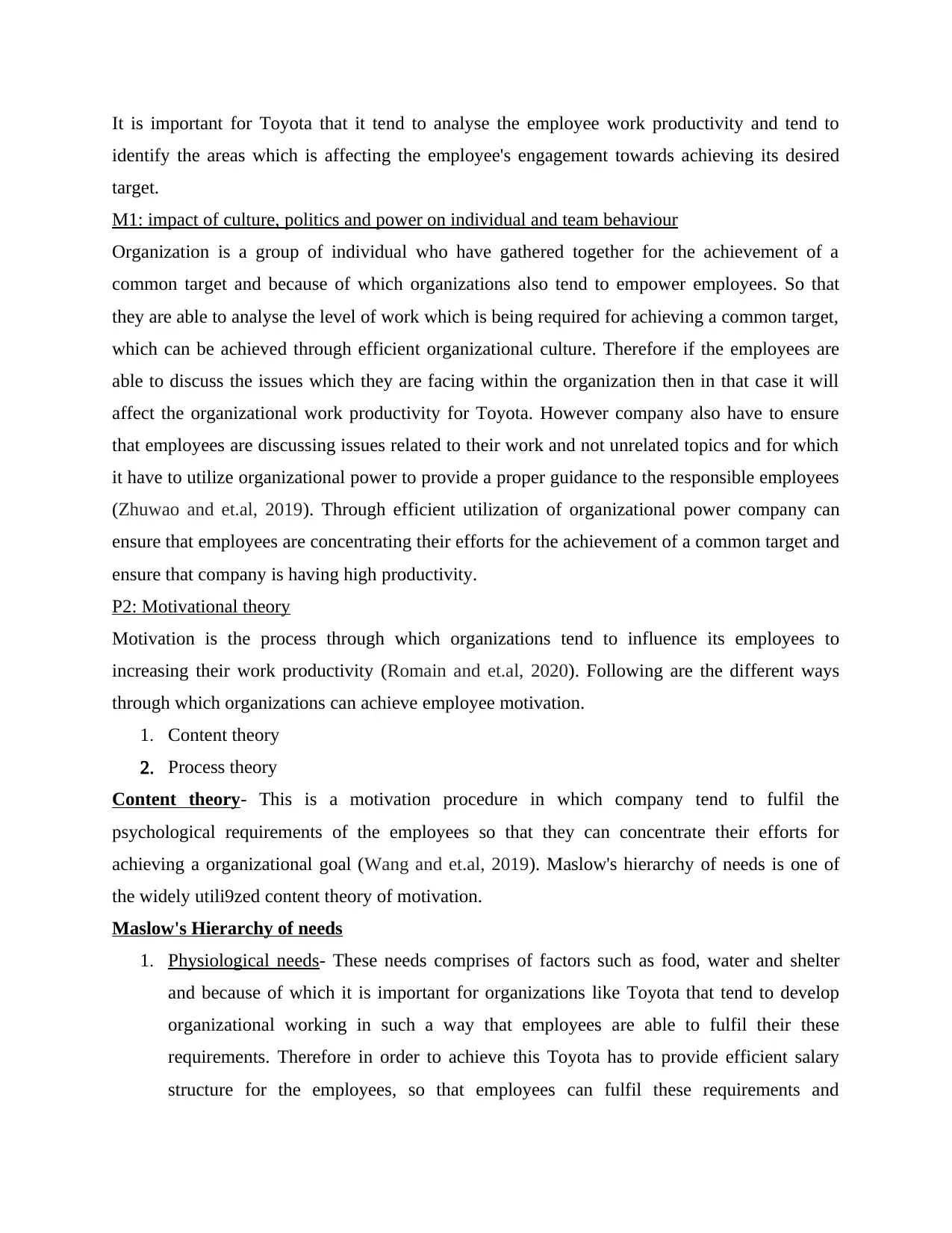
It is important for Toyota that it tend to analyse the employee work productivity and tend to
identify the areas which is affecting the employee's engagement towards achieving its desired
target.
M1: impact of culture, politics and power on individual and team behaviour
Organization is a group of individual who have gathered together for the achievement of a
common target and because of which organizations also tend to empower employees. So that
they are able to analyse the level of work which is being required for achieving a common target,
which can be achieved through efficient organizational culture. Therefore if the employees are
able to discuss the issues which they are facing within the organization then in that case it will
affect the organizational work productivity for Toyota. However company also have to ensure
that employees are discussing issues related to their work and not unrelated topics and for which
it have to utilize organizational power to provide a proper guidance to the responsible employees
(Zhuwao and et.al, 2019). Through efficient utilization of organizational power company can
ensure that employees are concentrating their efforts for the achievement of a common target and
ensure that company is having high productivity.
P2: Motivational theory
Motivation is the process through which organizations tend to influence its employees to
increasing their work productivity (Romain and et.al, 2020). Following are the different ways
through which organizations can achieve employee motivation.
1. Content theory
2. Process theory
Content theory- This is a motivation procedure in which company tend to fulfil the
psychological requirements of the employees so that they can concentrate their efforts for
achieving a organizational goal (Wang and et.al, 2019). Maslow's hierarchy of needs is one of
the widely utili9zed content theory of motivation.
Maslow's Hierarchy of needs
1. Physiological needs- These needs comprises of factors such as food, water and shelter
and because of which it is important for organizations like Toyota that tend to develop
organizational working in such a way that employees are able to fulfil their these
requirements. Therefore in order to achieve this Toyota has to provide efficient salary
structure for the employees, so that employees can fulfil these requirements and
identify the areas which is affecting the employee's engagement towards achieving its desired
target.
M1: impact of culture, politics and power on individual and team behaviour
Organization is a group of individual who have gathered together for the achievement of a
common target and because of which organizations also tend to empower employees. So that
they are able to analyse the level of work which is being required for achieving a common target,
which can be achieved through efficient organizational culture. Therefore if the employees are
able to discuss the issues which they are facing within the organization then in that case it will
affect the organizational work productivity for Toyota. However company also have to ensure
that employees are discussing issues related to their work and not unrelated topics and for which
it have to utilize organizational power to provide a proper guidance to the responsible employees
(Zhuwao and et.al, 2019). Through efficient utilization of organizational power company can
ensure that employees are concentrating their efforts for the achievement of a common target and
ensure that company is having high productivity.
P2: Motivational theory
Motivation is the process through which organizations tend to influence its employees to
increasing their work productivity (Romain and et.al, 2020). Following are the different ways
through which organizations can achieve employee motivation.
1. Content theory
2. Process theory
Content theory- This is a motivation procedure in which company tend to fulfil the
psychological requirements of the employees so that they can concentrate their efforts for
achieving a organizational goal (Wang and et.al, 2019). Maslow's hierarchy of needs is one of
the widely utili9zed content theory of motivation.
Maslow's Hierarchy of needs
1. Physiological needs- These needs comprises of factors such as food, water and shelter
and because of which it is important for organizations like Toyota that tend to develop
organizational working in such a way that employees are able to fulfil their these
requirements. Therefore in order to achieve this Toyota has to provide efficient salary
structure for the employees, so that employees can fulfil these requirements and
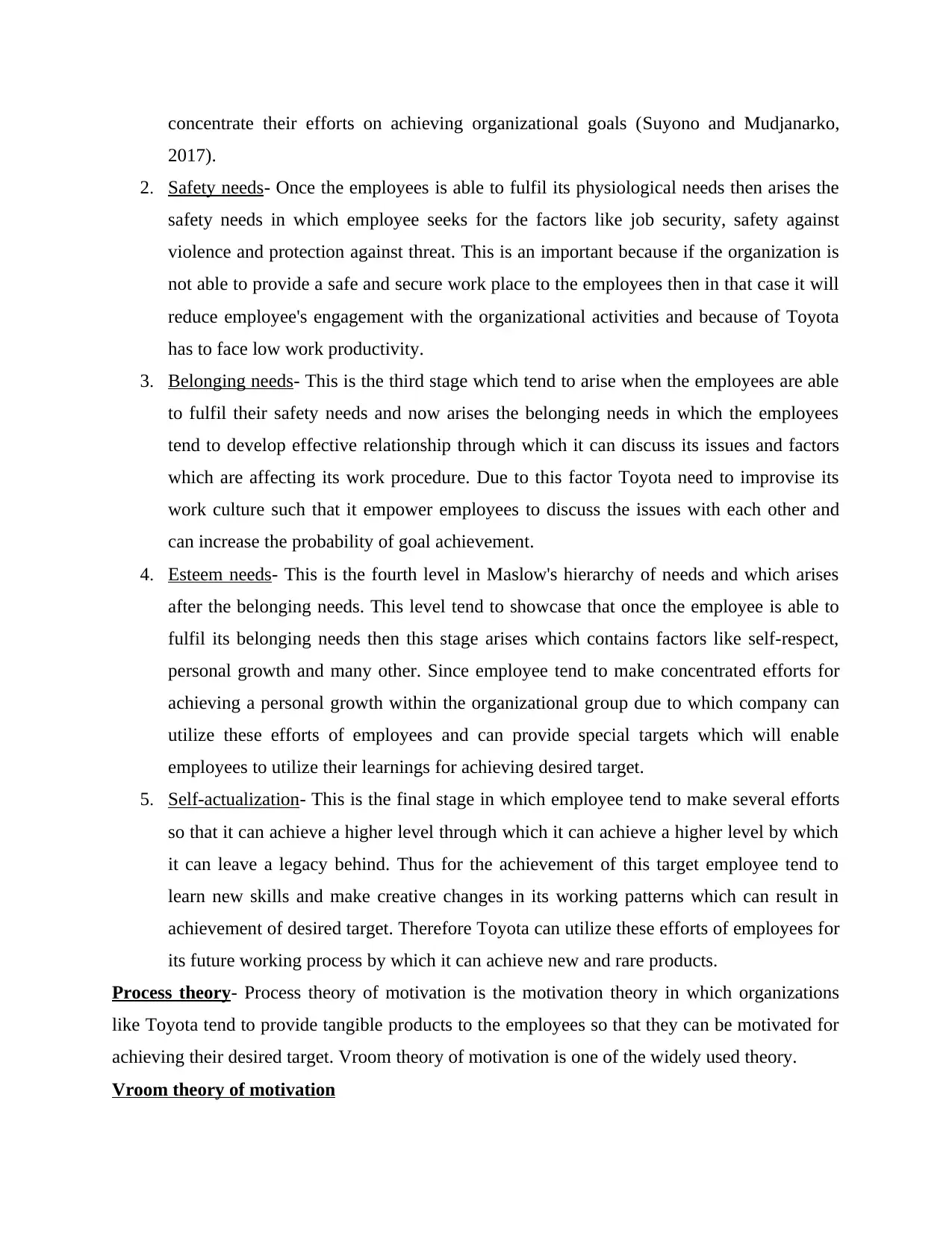
concentrate their efforts on achieving organizational goals (Suyono and Mudjanarko,
2017).
2. Safety needs- Once the employees is able to fulfil its physiological needs then arises the
safety needs in which employee seeks for the factors like job security, safety against
violence and protection against threat. This is an important because if the organization is
not able to provide a safe and secure work place to the employees then in that case it will
reduce employee's engagement with the organizational activities and because of Toyota
has to face low work productivity.
3. Belonging needs- This is the third stage which tend to arise when the employees are able
to fulfil their safety needs and now arises the belonging needs in which the employees
tend to develop effective relationship through which it can discuss its issues and factors
which are affecting its work procedure. Due to this factor Toyota need to improvise its
work culture such that it empower employees to discuss the issues with each other and
can increase the probability of goal achievement.
4. Esteem needs- This is the fourth level in Maslow's hierarchy of needs and which arises
after the belonging needs. This level tend to showcase that once the employee is able to
fulfil its belonging needs then this stage arises which contains factors like self-respect,
personal growth and many other. Since employee tend to make concentrated efforts for
achieving a personal growth within the organizational group due to which company can
utilize these efforts of employees and can provide special targets which will enable
employees to utilize their learnings for achieving desired target.
5. Self-actualization- This is the final stage in which employee tend to make several efforts
so that it can achieve a higher level through which it can achieve a higher level by which
it can leave a legacy behind. Thus for the achievement of this target employee tend to
learn new skills and make creative changes in its working patterns which can result in
achievement of desired target. Therefore Toyota can utilize these efforts of employees for
its future working process by which it can achieve new and rare products.
Process theory- Process theory of motivation is the motivation theory in which organizations
like Toyota tend to provide tangible products to the employees so that they can be motivated for
achieving their desired target. Vroom theory of motivation is one of the widely used theory.
Vroom theory of motivation
2017).
2. Safety needs- Once the employees is able to fulfil its physiological needs then arises the
safety needs in which employee seeks for the factors like job security, safety against
violence and protection against threat. This is an important because if the organization is
not able to provide a safe and secure work place to the employees then in that case it will
reduce employee's engagement with the organizational activities and because of Toyota
has to face low work productivity.
3. Belonging needs- This is the third stage which tend to arise when the employees are able
to fulfil their safety needs and now arises the belonging needs in which the employees
tend to develop effective relationship through which it can discuss its issues and factors
which are affecting its work procedure. Due to this factor Toyota need to improvise its
work culture such that it empower employees to discuss the issues with each other and
can increase the probability of goal achievement.
4. Esteem needs- This is the fourth level in Maslow's hierarchy of needs and which arises
after the belonging needs. This level tend to showcase that once the employee is able to
fulfil its belonging needs then this stage arises which contains factors like self-respect,
personal growth and many other. Since employee tend to make concentrated efforts for
achieving a personal growth within the organizational group due to which company can
utilize these efforts of employees and can provide special targets which will enable
employees to utilize their learnings for achieving desired target.
5. Self-actualization- This is the final stage in which employee tend to make several efforts
so that it can achieve a higher level through which it can achieve a higher level by which
it can leave a legacy behind. Thus for the achievement of this target employee tend to
learn new skills and make creative changes in its working patterns which can result in
achievement of desired target. Therefore Toyota can utilize these efforts of employees for
its future working process by which it can achieve new and rare products.
Process theory- Process theory of motivation is the motivation theory in which organizations
like Toyota tend to provide tangible products to the employees so that they can be motivated for
achieving their desired target. Vroom theory of motivation is one of the widely used theory.
Vroom theory of motivation
Paraphrase This Document
Need a fresh take? Get an instant paraphrase of this document with our AI Paraphraser

Vroom expectancy theory tend to show that employee tend to implement improvisations in their
work process such that they are able to achieve high work productivity and also at the same time
minimize efforts. Due to which it showcases that employee's motivation towards achieving its
desired target is an collaborative approach of cognitive decisions, therefore the vroom
expectancy theory is categorised into fo0llowing segments.
1. Expectancy- This segment of employee motivation tend to showcase that employees will
establish more efforts if they achieve a sense of achieving a better present and because of
which will establish more efforts for achieving the desired organizational goal. Due to
this factor Toyota need to showcase improved organizational position which employees
can achieve if they are able to achieve specific desired target (Fallatah and Syed, 2018).
This will motivate employees to analyse their work procedure and differentiate the
difference for achieving the desired work productivity.
2. Instrumentality- This is an belief which employee tend to have that if it is able to perform
well then it can achieve a better level of performance in the upcoming levels and this is
the factor which motivates employees to analyse their performance so that they can make
improvisations in the weak sections. Since high level of evaluation is done by the
employee regarding to the effectiveness of the benefits which can be provided and self
motivation for achieving those targets through which it can improve its upcoming work
conditions.
3. Valence- Valence is the final segments of vroom employee motivation in which
employee tend to analyse the effectiveness of the benefits which it will be achieving
through implementing changes in its work procedure (Thoha and Rasidi, 2020). This is
an important segment for Toyota that it tend to showcase an appropriate advantage which
employees will be having by implementing changes.
M2: Critical evaluation of behavioural motivation on employee performance
Organizations tend to develop their organizational working in such a way that it is able to
achieve high level of work productivity and with that it also has ensure that organizational
expenditures are done in an controlled way, so that company can maintain efficient economic
growth. Due to this it has make sure that employees are motivated for implementing changes in
their work procedure and increasing efforts so that overall work productivity of the Toyota can
be increased. Despite of several advantages it becomes very important for organization to
work process such that they are able to achieve high work productivity and also at the same time
minimize efforts. Due to which it showcases that employee's motivation towards achieving its
desired target is an collaborative approach of cognitive decisions, therefore the vroom
expectancy theory is categorised into fo0llowing segments.
1. Expectancy- This segment of employee motivation tend to showcase that employees will
establish more efforts if they achieve a sense of achieving a better present and because of
which will establish more efforts for achieving the desired organizational goal. Due to
this factor Toyota need to showcase improved organizational position which employees
can achieve if they are able to achieve specific desired target (Fallatah and Syed, 2018).
This will motivate employees to analyse their work procedure and differentiate the
difference for achieving the desired work productivity.
2. Instrumentality- This is an belief which employee tend to have that if it is able to perform
well then it can achieve a better level of performance in the upcoming levels and this is
the factor which motivates employees to analyse their performance so that they can make
improvisations in the weak sections. Since high level of evaluation is done by the
employee regarding to the effectiveness of the benefits which can be provided and self
motivation for achieving those targets through which it can improve its upcoming work
conditions.
3. Valence- Valence is the final segments of vroom employee motivation in which
employee tend to analyse the effectiveness of the benefits which it will be achieving
through implementing changes in its work procedure (Thoha and Rasidi, 2020). This is
an important segment for Toyota that it tend to showcase an appropriate advantage which
employees will be having by implementing changes.
M2: Critical evaluation of behavioural motivation on employee performance
Organizations tend to develop their organizational working in such a way that it is able to
achieve high level of work productivity and with that it also has ensure that organizational
expenditures are done in an controlled way, so that company can maintain efficient economic
growth. Due to this it has make sure that employees are motivated for implementing changes in
their work procedure and increasing efforts so that overall work productivity of the Toyota can
be increased. Despite of several advantages it becomes very important for organization to
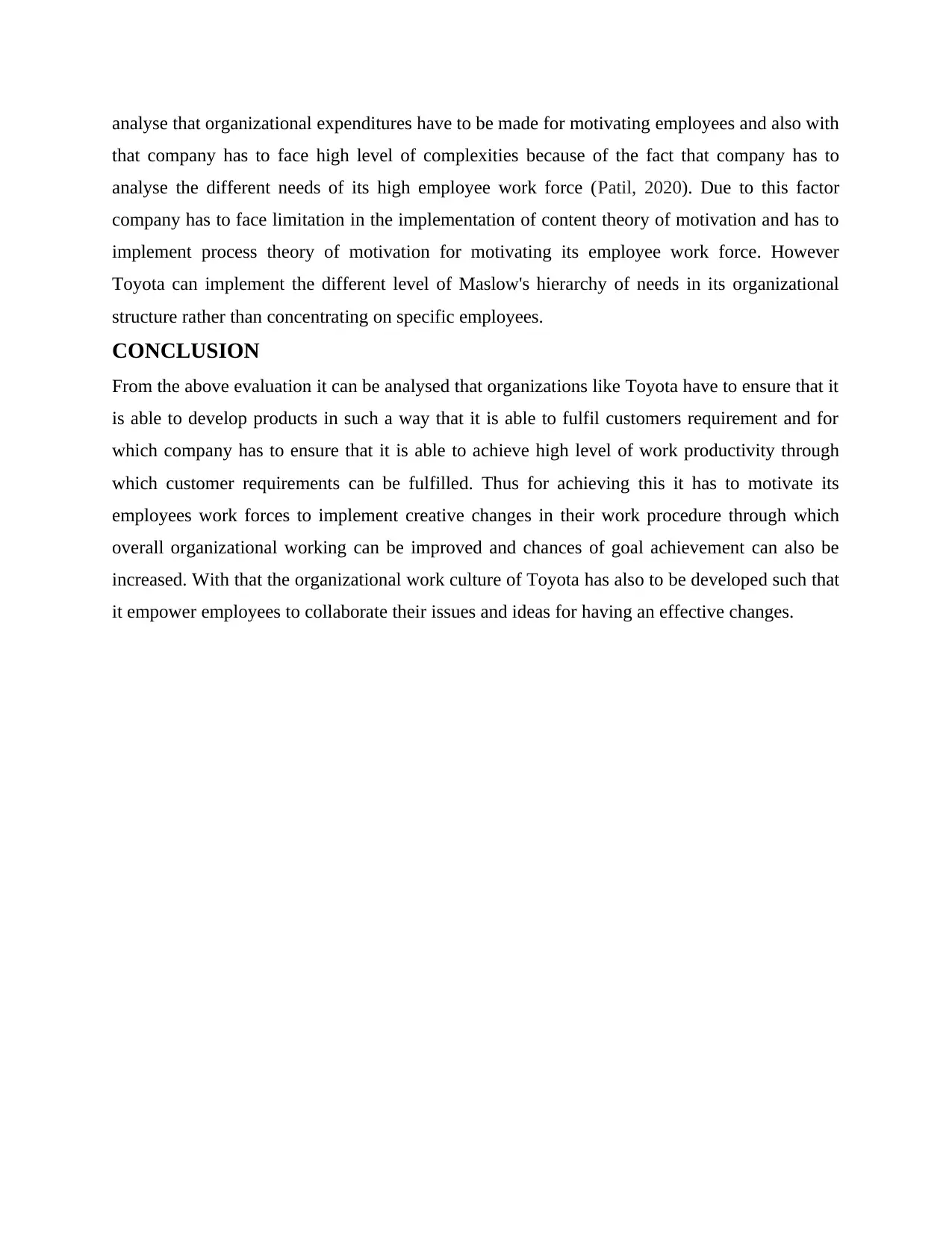
analyse that organizational expenditures have to be made for motivating employees and also with
that company has to face high level of complexities because of the fact that company has to
analyse the different needs of its high employee work force (Patil, 2020). Due to this factor
company has to face limitation in the implementation of content theory of motivation and has to
implement process theory of motivation for motivating its employee work force. However
Toyota can implement the different level of Maslow's hierarchy of needs in its organizational
structure rather than concentrating on specific employees.
CONCLUSION
From the above evaluation it can be analysed that organizations like Toyota have to ensure that it
is able to develop products in such a way that it is able to fulfil customers requirement and for
which company has to ensure that it is able to achieve high level of work productivity through
which customer requirements can be fulfilled. Thus for achieving this it has to motivate its
employees work forces to implement creative changes in their work procedure through which
overall organizational working can be improved and chances of goal achievement can also be
increased. With that the organizational work culture of Toyota has also to be developed such that
it empower employees to collaborate their issues and ideas for having an effective changes.
that company has to face high level of complexities because of the fact that company has to
analyse the different needs of its high employee work force (Patil, 2020). Due to this factor
company has to face limitation in the implementation of content theory of motivation and has to
implement process theory of motivation for motivating its employee work force. However
Toyota can implement the different level of Maslow's hierarchy of needs in its organizational
structure rather than concentrating on specific employees.
CONCLUSION
From the above evaluation it can be analysed that organizations like Toyota have to ensure that it
is able to develop products in such a way that it is able to fulfil customers requirement and for
which company has to ensure that it is able to achieve high level of work productivity through
which customer requirements can be fulfilled. Thus for achieving this it has to motivate its
employees work forces to implement creative changes in their work procedure through which
overall organizational working can be improved and chances of goal achievement can also be
increased. With that the organizational work culture of Toyota has also to be developed such that
it empower employees to collaborate their issues and ideas for having an effective changes.
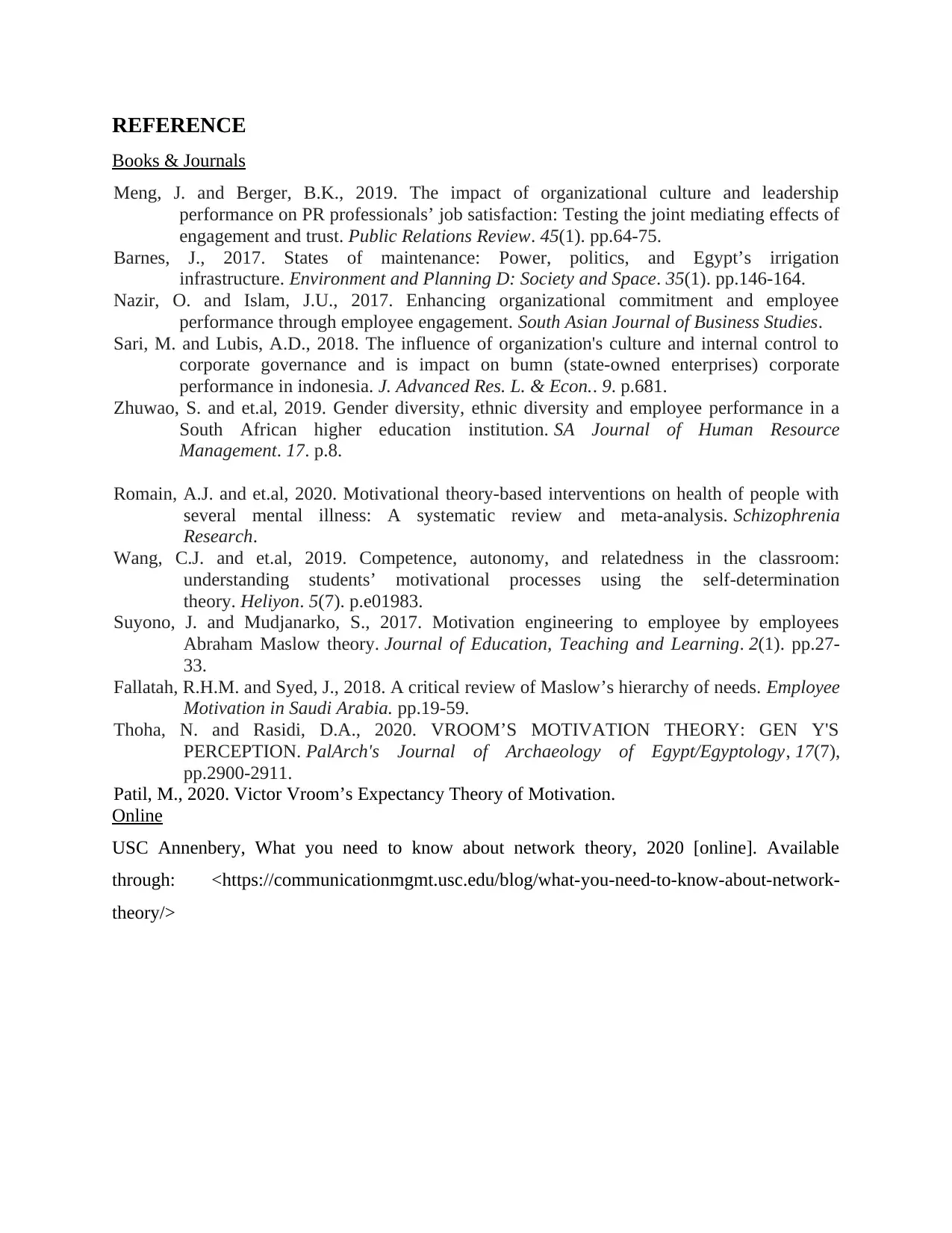
REFERENCE
Books & Journals
Meng, J. and Berger, B.K., 2019. The impact of organizational culture and leadership
performance on PR professionals’ job satisfaction: Testing the joint mediating effects of
engagement and trust. Public Relations Review. 45(1). pp.64-75.
Barnes, J., 2017. States of maintenance: Power, politics, and Egypt’s irrigation
infrastructure. Environment and Planning D: Society and Space. 35(1). pp.146-164.
Nazir, O. and Islam, J.U., 2017. Enhancing organizational commitment and employee
performance through employee engagement. South Asian Journal of Business Studies.
Sari, M. and Lubis, A.D., 2018. The influence of organization's culture and internal control to
corporate governance and is impact on bumn (state-owned enterprises) corporate
performance in indonesia. J. Advanced Res. L. & Econ.. 9. p.681.
Zhuwao, S. and et.al, 2019. Gender diversity, ethnic diversity and employee performance in a
South African higher education institution. SA Journal of Human Resource
Management. 17. p.8.
Romain, A.J. and et.al, 2020. Motivational theory-based interventions on health of people with
several mental illness: A systematic review and meta-analysis. Schizophrenia
Research.
Wang, C.J. and et.al, 2019. Competence, autonomy, and relatedness in the classroom:
understanding students’ motivational processes using the self-determination
theory. Heliyon. 5(7). p.e01983.
Suyono, J. and Mudjanarko, S., 2017. Motivation engineering to employee by employees
Abraham Maslow theory. Journal of Education, Teaching and Learning. 2(1). pp.27-
33.
Fallatah, R.H.M. and Syed, J., 2018. A critical review of Maslow’s hierarchy of needs. Employee
Motivation in Saudi Arabia. pp.19-59.
Thoha, N. and Rasidi, D.A., 2020. VROOM’S MOTIVATION THEORY: GEN Y'S
PERCEPTION. PalArch's Journal of Archaeology of Egypt/Egyptology, 17(7),
pp.2900-2911.
Patil, M., 2020. Victor Vroom’s Expectancy Theory of Motivation.
Online
USC Annenbery, What you need to know about network theory, 2020 [online]. Available
through: <https://communicationmgmt.usc.edu/blog/what-you-need-to-know-about-network-
theory/>
Books & Journals
Meng, J. and Berger, B.K., 2019. The impact of organizational culture and leadership
performance on PR professionals’ job satisfaction: Testing the joint mediating effects of
engagement and trust. Public Relations Review. 45(1). pp.64-75.
Barnes, J., 2017. States of maintenance: Power, politics, and Egypt’s irrigation
infrastructure. Environment and Planning D: Society and Space. 35(1). pp.146-164.
Nazir, O. and Islam, J.U., 2017. Enhancing organizational commitment and employee
performance through employee engagement. South Asian Journal of Business Studies.
Sari, M. and Lubis, A.D., 2018. The influence of organization's culture and internal control to
corporate governance and is impact on bumn (state-owned enterprises) corporate
performance in indonesia. J. Advanced Res. L. & Econ.. 9. p.681.
Zhuwao, S. and et.al, 2019. Gender diversity, ethnic diversity and employee performance in a
South African higher education institution. SA Journal of Human Resource
Management. 17. p.8.
Romain, A.J. and et.al, 2020. Motivational theory-based interventions on health of people with
several mental illness: A systematic review and meta-analysis. Schizophrenia
Research.
Wang, C.J. and et.al, 2019. Competence, autonomy, and relatedness in the classroom:
understanding students’ motivational processes using the self-determination
theory. Heliyon. 5(7). p.e01983.
Suyono, J. and Mudjanarko, S., 2017. Motivation engineering to employee by employees
Abraham Maslow theory. Journal of Education, Teaching and Learning. 2(1). pp.27-
33.
Fallatah, R.H.M. and Syed, J., 2018. A critical review of Maslow’s hierarchy of needs. Employee
Motivation in Saudi Arabia. pp.19-59.
Thoha, N. and Rasidi, D.A., 2020. VROOM’S MOTIVATION THEORY: GEN Y'S
PERCEPTION. PalArch's Journal of Archaeology of Egypt/Egyptology, 17(7),
pp.2900-2911.
Patil, M., 2020. Victor Vroom’s Expectancy Theory of Motivation.
Online
USC Annenbery, What you need to know about network theory, 2020 [online]. Available
through: <https://communicationmgmt.usc.edu/blog/what-you-need-to-know-about-network-
theory/>
1 out of 10
Related Documents
Your All-in-One AI-Powered Toolkit for Academic Success.
+13062052269
info@desklib.com
Available 24*7 on WhatsApp / Email
![[object Object]](/_next/static/media/star-bottom.7253800d.svg)
Unlock your academic potential
© 2024 | Zucol Services PVT LTD | All rights reserved.





